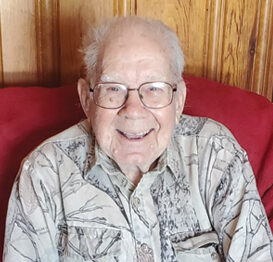85-year resident recalls simple pleasures of early Bath
by Laura Bednar
Carl Duncan, age 95, moved to Bath Township when he was just 10 years old, and he never left. He has seen the transformation of the township over eight decades from a majority farming country to a burgeoning area with more homes and local businesses. Duncan said he stayed through it all because he enjoys the quiet and peaceful life he has carved out for himself in Bath.
Duncan, his parents, and four siblings moved from Sharon Center to Bath in 1938, when his father was offered a job working on Doolittle Farm, the first farm east of what was then Town Hall on W. Bath Road. His family lived on the farm, with the children doing their fair share of work feeding the livestock and helping in the fields.
“At the time, we didn’t think it was a good life, but looking back, you see it was pretty good,” Duncan said.
He recalled walking about a mile every day to the former brick schoolhouse on W. Bath Road, which had two wooden portable buildings for older grades, warmed with potbelly stoves in the winter. There were 90 kids total in the high school, and Duncan said there were only 12 players on the football team. He played football and basketball.
Activities of the time were damming the local creek to make a swimming hole, creating a sled from wooden barrel stays and a box, and at the time, “Every boy had a slingshot,” Duncan said.
Shoes were reserved for church, school or other occasions out. The rest of the time was spent barefoot, which was fine for Duncan, who received mostly hand-me-downs as the baby of the family.
He was drafted for WWII almost immediately after graduating from school and joined the Army Air Force. He was stationed in Greenland at a place where planes came to refuel before going to England. Part of his duties included checking the weather conditions to ensure it was suitable for flight.
After returning from war, Duncan married his late wife, Opal, in 1950. He described seeing her for the first time when visiting a friend at an Everett Road farm. Opal was walking along a path by the back of the farm in just jeans and a T-shirt. He was immediately drawn to her.
“It really was love at first sight,” he said, adding that she was the best-natured girl, only recalling a couple times they actually fought during their 63 years of marriage.
The couple was married at Ghent Church and lived in an apartment on Ghent Road for a couple years before buying a basement home in 1952 on N. Cleveland-Massillon Road. Duncan built a house on top of the home himself, paneling the walls because he wasn’t skilled at plastering. He remains in the same house today.
His work ethic extended beyond building a home as he worked for a shop called Air Maids for 41 years. The company produced air and oil filters, half of which were used for government planes and tanks. Early in his career, Duncan worked daily at one shop in Cleveland for 10 hours and another shop 45 minutes away for an eight-hour shift. He made $1.10 per hour.
He eventually scaled back to just working at Air Maids, but not without taking on odd jobs as needed, such as digging graves at a cemetery in Bath.
The largest snowstorm he can remember happened in 1950 the day after Thanksgiving. It had been snowing all day and everyone’s car at work was stuck, so he decided to walk to his first apartment on Ghent, more than 20 miles from the shop on Harvard Road in Cleveland.
Duncan and his wife had two children, Edward (deceased) and Brenda. He now has two grandchildren, seven great grandchildren and two great-great grandchildren.
His hobbies are hunting and fishing. “I kept a lot of meat on the table,” he said. The meat was canned and cured in the smokehouse when he was growing up, because there was no refrigeration. When his family eventually had electricity and running water in their home, it was a luxury.
That wasn’t the only change he saw in his 95 years of living. He said Bath used to be mostly farms. The only brick road was Cleveland-Massillon; the rest were gravel. There was a grocery store where the current post office sits, and the Ghent area had a barber, doctor, tavern and cider mill. Duncan said Bath used to have only a volunteer fire department located at present-day Bath Tractor.
Duncan has seen not only physical changes in the township but changes among people in the world today.
“We had no locks growing up,” he said. “Neighbors knew neighbors and helped each other out. Now it’s a dog-eat-dog world.”
He added that a man’s handshake was better than paper. “Your word was your life,” he said.
Though the world has changed, Duncan has remained steadfast in his values and principles. He enjoys spending time at home and tapping his maple trees to make syrup.
Many of his siblings lived to be in their 90s, and he is no exception.
“My brother lived to be 97, so I’m trying to beat him,” Duncan said, laughing. ∞

